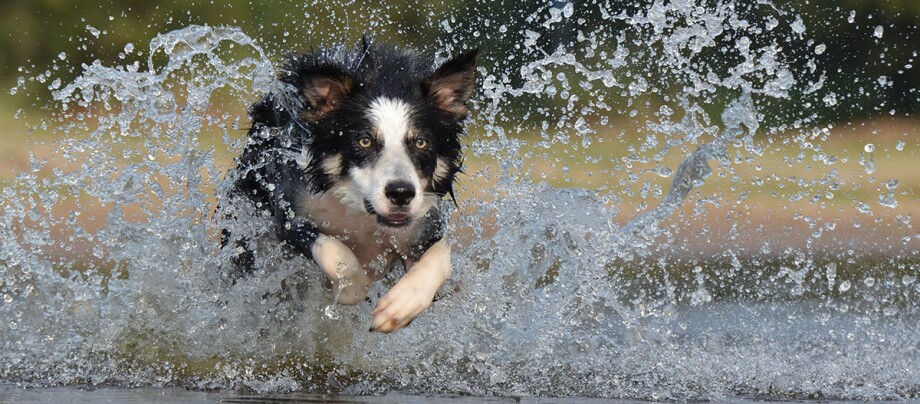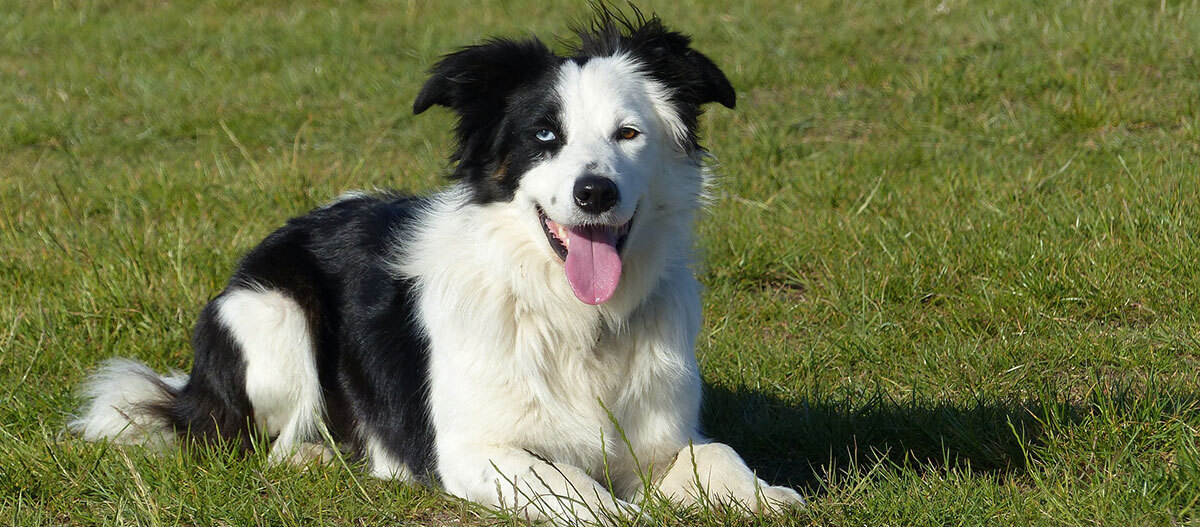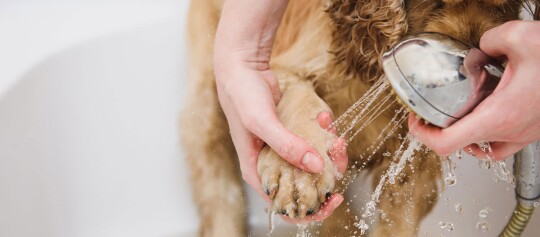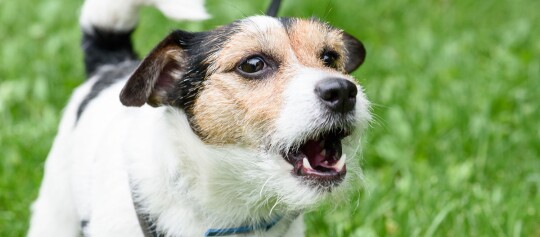The Border Collie – the Einstein of dogs
17.02.2024 - Reading time: 8 minutes

A workaholic among dogs, the Border Collie needs to have a job, otherwise it will find one for itself. Among other things, Border collies that are bored may try to “herd” cyclists, pedestrians or children at the playground. If these intelligent dogs have enough to do and are able to tire themselves out, they will prove a great companion that will add lots of joy to your life.
- The Border Collie breed: A real winner
- The Border Collie: A proper sheepdog
- Border Collie profile
- Border Collie colours: Typical colour combinations
- What is the Border Collie’s temperament like?
- Training and care: Who are Border Collies suitable for?
- Is a Border Collie a good dog for first-time owners?
- Is a Border Collie a family dog?
- Looking after a Border Collie with ease
- The Border Collie and its diet
- Buying a Border Collie: What to consider
The Border Collie breed: A real winner
In the 1870s, competitions for sheepdogs were held in rural England. Spurred on by these, local shepherds placed great value on cleverness and talent in breeding their dogs. The look of the dogs took a backseat, with their qualities as a four-legged herder taking priority. Soon, people began to focus on breeding Border Collies systematically. One male named “Old Hemp” is considered to be the progenitor, and his descendants became competition champions from then on. From the 1970s onwards, the breed reached Germany and since then, has enjoyed vast popularity as a sheepdog and outdoors dog alike. The Border Collie’s name stems from its original region, the border region between Scotland and England. Meanwhile, there are few limits when it comes to the colours of Border Collies: Many colours and combinations are permitted; but the fur must not be predominantly white. With a shoulder height of up to 58 centimetres in males and 50 centimetres in females, Border Collies are much smaller than their namesakes, Rough (or Long-Haired) Collies.
The Border Collie: A proper sheepdog
The Fédération Cynologique International (FCI) has existed since 1911, and is responsible for classifying dog breeds into different groups and defining breeding and breed standards. A total of ten FCI groups describe the point from which a dog is officially considered a pedigree. The Border Collie belongs to FCI group 1, which covers herding and cattle dogs and more precisely – in section 1 of this group – shepherd dogs. This group also includes, for example, the German Shepherd Dog or the Australian Shepherd.
NewsletterBorder Collies
Breed | Border Collie |
Origin | Great Britain (England/Scotland) |
Classification | Working dog and sheepdog |
Size | Males 48 to 58 cm at shoulder height – females 46 to 50 cm at shoulder height |
Weight | Males 15 to 21 kg - females 13 to 19 kg |
Physique | muscular, flexible, longer than it is tall |
Eyes | brown (for colour variant Blue Merle: blue) |
Ears | medium sized, upright, tilted forward |
Coat and colour | bushy hair or medium length with mane, flag and feathers, thick undercoat, weatherproof top coat; many colour variants, never predominantly white |
Special features | pronounced herding instinct and very active, loves water and mud |
Nature | active, temperamental, sensitive, affectionate, obedient, intelligent |
Care | regular brushing, bathing only in exceptional cases |
Health | occasionally susceptible to eye diseases, epilepsy and MDR1 defect (medication intolerance such as medication containing ivermectin); when breeding, make sure not to cross-breed any Merle dogs |
You will find the best products for your Border Collie here!
Border Collie colours: Typical colour combinations
Nowadays, two hair variants are recognised in Border Collies. A distinction is made between Border Collies with short hair or a moderately long coat. A range of different colour combinations are permitted, but white should never be the majority. Typical colour combinations seen in the Border Collie include black-white, brown-white, blue-merle or red-merle. What is known as the “Merle Factor”, however, can have a negative impact on Border Collie health and lead to blindness and deafness, as well as a lower life expectancy, to name a few effects. Puppies whose parents both carry the Merle gene are especially affected. For this reason, breeding two Merle gene carriers is considered torture breeding and is banned in Germany.
This dog breed is also typically known for tan markings, which are usually found in the faces of Border Collies. These are areas of fur that have a light, red-brown colouring (also known as tawny colours).
If you are looking for a specific colour combination, you can find out from different Border Collie breeders beforehand whether they breed them in your colour preference. However, make sure that they are reputable breeders that treat their dogs responsibly and are able to help you with any questions about the breed.
An experienced breeder is usually a trustworthy contact partner if you are toying with the idea of buying a Border Collie puppy. Some people prefer to go for a mongrel rather than a pedigree dog. You can find a Border Collie mix, for example, at an animal shelter.
What is the Border Collie’s temperament like?
Along with its endless willingness to work, the Border Collie boasts other exciting characteristics: It is playful, temperamental, attentive, loving and loyal. Thanks to its high level of intelligence, it can be trained well and quickly picks up even difficult tricks. One dominant feature is its pronounced herding instinct, which can become problematic away from actual use in agriculture if the animal is not given enough to do. A special quirk found in Border Collies is their preference for water and mud, which they love to play around in.

Training and care: Who are Border Collies suitable for?
Border Collies have to be trained consistently, and the programme should include athletic and mental tasks alike. This is because Border Collies feel at ease when not only physically, but also mentally challenged. You should therefore set aside at least three to four hours for your dog every day. When given enough to do, the Border Collie is motivated by its devotion and intelligence and is easy to manage. It is the perfect partner for athletic individuals that enjoy getting moving with their dog. But to be clear, exercise means more than just a comfortable stroll: Due to its special characteristics, the Border Collie needs a whole lot of action! This active breed enjoys agility and obedience sports. But be aware that even a working dog like the Border Collie needs plenty of breaks every now and again to recover. The exercise programme can even have a negative effect if too varied.
During training, it is recommend that you focus on concentration and familiarisation with the environment to calm the animal down to some degree. Keeping the animal solely in an apartment is not fair to it, based on the activity level of the Border Collie. A house with access to a garden is ideal. All these aspects are also worth considering if you want to have a Border Collie mix instead of a pedigree. Another thing to be aware of is that the importance of good training begins in puppyhood. This should be done consistently, but with love. Pressure and compulsion are counterproductive in this dog breed, as the Border Collie has a sensitive nature.
Is a Border Collie a good dog for first-time owners?
A Border Collie tends not to be a good first dog. To ensure the Border Collie puppy becomes a loyal companion and you can enjoy a harmonious life together, it is important to start consistent, loving training while it is still a puppy.
Is a Border Collie a family dog?
The Border Collie likes to be close to its owners and is therefore very popular as a family dog. Due to its love for work and restlessness, the Border Collie, however, is only ideal as a social family dog in certain cases. This applies particularly for Border Collies that are bred according to use, i.e. as a working dog.
Looking after a Border Collie with ease
The Border Collie’s coat is low-maintenance; regular brushing and checking for matting is enough. Remove any knots in the fur carefully using a metal comb. Occasional correction cuts on long sections of fur may be needed. Given their nature as keen swimmers, Border Collies will look for possible paddling spots automatically. Baths are only needed in emergencies if they get dirty, as their fur practically cleans itself. Particularly after extensive trips outdoors, you should check the eyes, ears and paws and treat these if needed.
The Border Collie and its diet
Regardless of what breed of dog you have, diet has a crucial impact on its health – and the Border Collie is no exception. The right diet depends on a lot of individual factors. For example, Border Collie puppies need different food to adult or senior dogs. Housing conditions and activity level also play a key role in a dog’s diet. A Border Collie working in herding will have a greater energy requirement than one leading a calmer life as a family dog. If the lively pet has specific allergies, food intolerances or is overweight, special attention also needs to be given to its diet.
Like with other dog breeds, meat should also be top of the ingredients list for Border Collies. Aside from this, the daily diet should include plenty of vegetables, fruit and omega 3 fatty acids. Whether this is restricted to wet or dry food solely depends on the dog and its owner’s preference. Of course, your furry friend can also be rewarded with some treats every now and again. To prevent overfeeding (Border Collies usually utilise food very well), extra treats should, however, be left out of daily rations.
Buying a Border Collie: What to consider
Active, playful, attentive, intelligent, loveable and loyal – given these qualities, it is not hard to fall in love with a border collie straight away. But what are some reasons not to buy a Border Collie? If you are considering buying a Border Collie, you should consider exactly whether you can meet the high requirements it comes with. Ultimately, the nature of a Border Collie requires you to take a lot of time for it, provide a variety of different activities and last but not least, requires experience in keeping dogs. Underworked border collies may take on problematic qualities in everyday life and may even try to “herd” cyclists, walkers or children.
If the requirements are met, however, you are sure to be happy with a Border Collie as your loyal companion!

